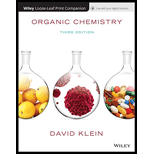
(a)
Interpretation:
The pI value for the given set of amino acids needs to be calculated.
Concept introduction:
Amino acids at a particular pH does not migrate in an electric field. This pH is known as the isoelectric point. The isoelectric point is also known as isoionic point. At this isoelectric point the amino acid is neutral. This means that the zwitterion form predominates more over the other forms. pI is the isoelectric point and this can be given by average of the pKa.
To find: the pI value of aspartic acid
(b)
Interpretation:
The pI value for the given set of amino acids needs to be calculated.
Concept introduction:
Amino acids at a particular pH does not migrate in an electric field. This pH is known as the isoelectric point. The isoelectric point is also known as isoionic point. At this isoelectric point the amino acid is neutral. This means that the zwitterion form predominates more over the other forms. pI is the isoelectric point and this can be given by average of the pKa.
To find : the pI value of leucine
(c)
Interpretation:
The pI value for the given set of amino acids needs to be calculated.
Concept introduction:
Amino acids at a particular pH does not migrate in an electric field. This pH is known as the isoelectric point. The isoelectric point is also known as isoionic point. At this isoelectric point the amino acid is neutral. This means that the zwitterion form predominates more over the other forms. pI is the isoelectric point and this can be given by average of the pKa.
To find : the pI value of lysine
(d)
Interpretation:
The pI value for the given set of amino acids needs to be calculated.
Concept introduction:
Amino acids at a particular pH does not migrate in an electric field. This pH is known as the isoelectric point. The isoelectric point is also known as isoionic point. At this isoelectric point the amino acid is neutral. This means that the zwitterion form predominates more over the other forms. pI is the isoelectric point and this can be given by average of the pKa.
To find: the pI value of proline
Want to see the full answer?
Check out a sample textbook solution
Chapter 25 Solutions
ORGANIC CHEMISTRY-PRINT COMPANION (LL)
 ChemistryChemistryISBN:9781305957404Author:Steven S. Zumdahl, Susan A. Zumdahl, Donald J. DeCostePublisher:Cengage Learning
ChemistryChemistryISBN:9781305957404Author:Steven S. Zumdahl, Susan A. Zumdahl, Donald J. DeCostePublisher:Cengage Learning ChemistryChemistryISBN:9781259911156Author:Raymond Chang Dr., Jason Overby ProfessorPublisher:McGraw-Hill Education
ChemistryChemistryISBN:9781259911156Author:Raymond Chang Dr., Jason Overby ProfessorPublisher:McGraw-Hill Education Principles of Instrumental AnalysisChemistryISBN:9781305577213Author:Douglas A. Skoog, F. James Holler, Stanley R. CrouchPublisher:Cengage Learning
Principles of Instrumental AnalysisChemistryISBN:9781305577213Author:Douglas A. Skoog, F. James Holler, Stanley R. CrouchPublisher:Cengage Learning Organic ChemistryChemistryISBN:9780078021558Author:Janice Gorzynski Smith Dr.Publisher:McGraw-Hill Education
Organic ChemistryChemistryISBN:9780078021558Author:Janice Gorzynski Smith Dr.Publisher:McGraw-Hill Education Chemistry: Principles and ReactionsChemistryISBN:9781305079373Author:William L. Masterton, Cecile N. HurleyPublisher:Cengage Learning
Chemistry: Principles and ReactionsChemistryISBN:9781305079373Author:William L. Masterton, Cecile N. HurleyPublisher:Cengage Learning Elementary Principles of Chemical Processes, Bind...ChemistryISBN:9781118431221Author:Richard M. Felder, Ronald W. Rousseau, Lisa G. BullardPublisher:WILEY
Elementary Principles of Chemical Processes, Bind...ChemistryISBN:9781118431221Author:Richard M. Felder, Ronald W. Rousseau, Lisa G. BullardPublisher:WILEY





